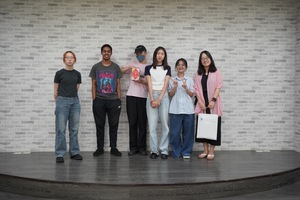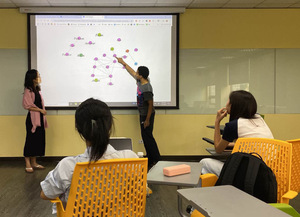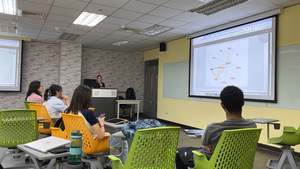UC Davis Computational Social Science Expert Brings Social Network Theory to Practice in GCIT Summer Course



【Article by GCIT】
Professor Cuihua (Cindy) Shen from the University of California, Davis (UC Davis) conducted an intensive two-week summer course at National Chengchi University's Master's Program in Global Communication and Innovation Technology (GCIT) from June 26 to July 11. The course challenged students to examine how digital platforms are fundamentally reshaping human communication, information flows, and society.
Professor Shen serves as a communication professor and co-founder of the Computational Communication Research Lab at UC Davis. Her research focuses on computational social science for social networks across platforms like Facebook, WeChat, and Massively Multiplayer Online Games, as well as the perception, diffusion, and intervention of multimodal misinformation in AI-mediated information ecosystems.
Over two weeks, the course challenged students to interrogate the structures that shape online communication while connecting theoretical frameworks to real-world digital experiences. Students explored topics including digital behavior patterns, data privacy issues, viral content mechanisms, meme diffusion, and content moderation, gaining insight into the often unseen mechanisms of social media platforms.
The curriculum included hands-on training in social network analysis using Gephi software, a professional tool for visualizing complex networks. Professor Shen noted that mastering these learning objectives “will give you a whole new perspective on the constructions and interactions of the (online) world.”
While social media has traditionally been studied through the lens of the information-to-attention economy transition, Professor Shen pushed students beyond surface-level concepts like engagement metrics or influencer marketing. Instead, she guided critical examination of visibility, capital, and centrality in digital spaces.
Students explored how algorithmic systems actively shape online experiences and how information diffusion patterns and interactions are deliberately constructed rather than naturally occurring. This approach revealed the deliberate design choices that influence user behavior and information spread.
The course’s second segment addressed how generative AI and multimodal content have transformed misinformation dynamics. Students grappled with fundamental questions: What is real? What is persuasive? What is harmful? These discussions spanned from individual content engagement and data control to societal regulation of Big Tech companies.
Professor Shen employed a hybrid teaching model accommodating both in-person and asynchronous learning through class discussions, readings, and media analysis. Documentary screenings including "Six Degrees of Separation" and "The Social Dilemma" prompted critical reflections on social network evolution and algorithm-driven platform impacts.
The program culminated with student presentations where participants visualized their own social capital using Gephi software. This capstone project demonstrated how students applied course concepts to analyze and interpret their digital networks through documented online interactions collected over one week.
This summer course represents part of GCIT's broader mission to prepare the next generation of communication professionals who can navigate the complex intersection of technology, society, and global communication. Moving forward, the program remains dedicated to expanding partnerships with leading international institutions and providing students with access to emerging research methodologies that will define the future of digital communication studies.
【此中英文稿和圖片獲中華民國文化部的補助;全球傳播與創新科技碩士學位學程亦獲文化部與教育部高等教育深耕計畫補助。】


 Fax:886-2-29379611
Fax:886-2-29379611